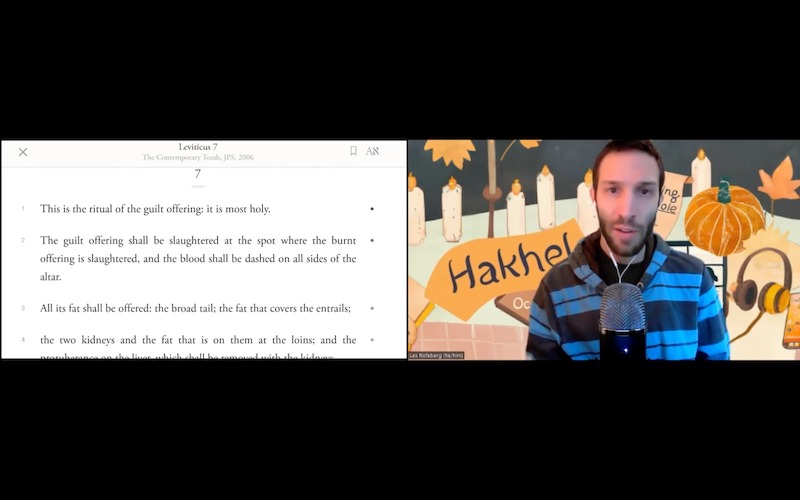Your Daily Phil: An intimate gathering in Tel Aviv + Evolving past the pandemic
Good Wednesday morning!
In today’s Your Daily Phil, we report on the evolution of Jewish organizations created for the pandemic, and feature an op-ed by M²’s Shira Hecht-Koller and Adam Eilath on authentic Jewish pedagogy. Also in this newsletter: Mark Suzman, Eric Rubin and Alma Gadot Perez. We’ll start with a recent gathering of Jewish philanthropists, entrepreneurs and leaders in Tel Aviv.
In the basement of Tel Aviv’s Heseg House on Rothschild Blvd. on Monday evening, some 30 philanthropists, academics, venture capitalists, startup founders and thought leaders milled about, chatting in both Hebrew and English over wine and vegan bao buns before settling in for a discussion with Shalem College President Russ Roberts, who hosts the EconTalk podcast.
They were there for the inaugural TLV Convening, the brainchild of venture capitalist and Orfin Ventures founder Adam Finkel. The Detroit native based the evening’s event on similar gatherings he’d helped to cultivate in his hometown, with a goal of hosting four to six events around Tel Aviv annually.
Finkel worked alongside Tel Aviv Foundation Chief Philanthropy Officer Michal Ben-Dov to bring together the group, a mix of native Israelis and immigrants. Seed funding was provided by the Charles and Lynn Schusterman Family Philanthropies through its microgrant program affiliated with ROI, the professional community where Finkel and Ben-Dov met. Part of future convenings, Finkel said, will involve other noted speakers, including government leaders.
“I saw that there’s deep and immersive community-building within a wide range of different groups like [the Jewish Funders Network] and Wexner, Mandel, and so much passion now within these communities, probably now more than ever before,” Finkel told eJewishPhilanthropy.
Finkel added, “But I also saw that there’s not a lot of interconnectivity between the different locations and backgrounds and ages and genders that are represented in those groups. So I felt that with such a changing world right now, it’s important more than ever to have cross collaboration of the leadership to promote a narrative that can get more people involved, provide more role models for other people to step up and be involved. And also to really see how we can accomplish that much more on a philanthropic economic development, community development side when we have more energy shared between us.”
In Michigan, Finkel served on the founding outreach team of the annual Detroit Homecoming, a weekend-long gathering that brings former Detroiters back to the city for three days of events and networking. “I saw that it has led to hundreds of millions of dollars of economic development just by getting the right people in the room,” Finkel, who also organizes an annual expat reception for former Jewish Detroiters, explained. “[We realized] that if you plant a seed, it can grow in all different directions.”
test of time


In May 2020, as internships, Jewish summer camps and trips to Israel were abruptly canceled due to the COVID-19 pandemic, thousands of Jewish college students stared down a summer with nothing to do. Scrambling to keep these young adults engaged, the Jewish Federations of North America threw together the Jewish Changemakers fellowship. Changemakers seemed like it might have an expiration date, with much of Jewish life — and the world more broadly — leaving Zoom behind. But Jewish organizations have found that some audiences still prefer meeting online, reports Lev Gringauz for eJewishPhilanthropy.
Added value: For Jewish organizations, retooling these programs means accepting that online connections are no longer a begrudging necessity of 2020, but a value-add in their own right. That’s as true for institutions that suddenly jumped to virtual as it is for initiatives that were already operating online before the pandemic. “We have a sense that on some level, the flow of every year for us will include large-scale gatherings of people in synchronous time online,” said Lex Rofeberg, a rabbi who serves as senior Jewish educator at Judaism Unbound, a podcast and online educational community. “We did not have that sense before. That is now a feature, not a bug.”
Increased accessibility: Commonpoint Queens, a New York City Jewish Community Center, is having success in virtual programming for older adults. Younger audiences, including families, have mostly gone back to in-person, the center has found, but many older adults are still social distancing for safety. Fifteen of 17 exercise classes for older adults are now hybrid, with the remaining two meeting entirely in person. Cultural arts programming, like book talks and history seminars, which often found an audience among older people, have also stayed online.
New alliances: The Israel Educational Travel Alliance (IETA) was one of the many 2020-era Jewish programs hastily put together over Whatsapp and centered on Zoom meetings. Now a coalition of roughly 90 Jewish and non-Jewish Israel trip providers, including Honeymoon Israel and Birthright, the alliance was conceived as a way to better navigate rapidly changing border policies worldwide, and brainstorm ways to deal with a sudden loss in funding and the ability to travel. But even as international tourism has resumed, the travel and hospitality industry has continued to struggle and the need for the alliance has outgrown its emergency origins.
text study
The power of presence: Havruta learning toward original Jewish pedagogy, practice and paradigms


“Jewish educators are, by nature, responsive and reactive. They are required to deliberately infuse Jewish content in their lessons while teaching students and communities that are dynamic. In the past two and a half years, this phenomenon has been accelerated and the demands placed upon Jewish educators have increased. We have collectively been tasked with reinventing our programs, lessons, work environments and goals to align with health and safety conditions, crises in mental health and a rapidly polarizing political climate,” write Shira Hecht-Koller, education director for M²’s Values in Action Initiative, and Adam Eilath, a faculty member of M²’s 2023 Pedagogies of Peoplehood Research Fellowship, in an opinion piece for eJewishPhilanthropy.
Proactive pedagogy: “In 2020, we were both given the opportunity to join the inaugural cohort of the Jewish Pedagogies Research Fellowship, an initiative of M². The initiative was started as a way to proactively encourage Jewish educators to design authentic pedagogical frameworks that are rooted in the Jewish tradition, rather than trying to retrofit a Jewish lens or Jewish values onto a preexisting educational framework.”
Community context: “While we both believed in the vision of this fellowship, we did not realize how powerful and necessary the experience would be. Over the course of a year, we were given the opportunity to slow down, think together, test ideas within the context of community and experiment with pedagogical practices without the usual pressures of a tight deadline or time-crunch. We were given license to take a step back and probe the foundations of our beliefs and worldviews and to align our personal educational frameworks and practices with our Jewish texts, traditions and identities. We were able to test out our practices with one another before bringing them to our communities of learners who were enriched as a result.”
Social learning: “In addition to the focus on content creation and pedagogical research, throughout the fellowship we were also afforded an intense and uplifting havruta experience. For the duration of the fellowship, in addition to learning in a habura model (in which learning happens in small groups), we learned together one-on-one in havruta every other week, to sharpen our thinking and expand our existing methodological frameworks. During a moment of social isolation, this feature of the fellowship provided a framework both for the refining of ideas and pedagogical processes and for establishing and deepening new relationships when they felt most critically needed.”
Worthy Reads
Tough Talk: Jewish Insider’s Melissa Weiss speaks to author Daniel Gordis about his recent closing address at AIPAC’s Political Leadership Forum last week, during which he addressed the challenges facing supporters of the U.S.-Israel relationship amid concerns over Israel’s new government. “I wanted them to understand that it’s OK to be very concerned about what’s going on in Israel. It’s OK to talk about what’s going on in Israel, and in a way of concern and worry, maybe even disappointment, and at the same moment to go out there and do the critically important work that has to be done on Capitol Hill and beyond to make sure that when there are critical issues that face Israel in Congress, that Congress votes the way that those of us who care about Israel would want it to vote. But I think that it was definitely not the usual tone. These are not the usual times.” [JI]
Shake Things Up in 2023: The start of a new year is known for being an unproductive season, so strategies to invigorate the workplace may help, Rae Ringel writes in the Harvard Business Review. “Another way to cut through the seasonal bleakness is to connect employees to what matters most. This may be the customers an organization caters to, the clients it serves, or users of the products it develops. When possible, it’s most powerful to make these connections happen in person, even if employees usually work remotely. A law firm, for example, might bring in a client whose life or business was impacted by the firm’s work, which wouldn’t have been possible without team members who may never have heard that client’s name. A software company may bring in beta testers who found a new product especially helpful. Office workers who support a manufacturing company may take a trip to the factory floor. Space for formal reflection after these encounters is critical. One quick but impactful exercise is to have employees map out the ways in which their work contributes to the organization’s overall mission. The idea is for people to see themselves as essential sparks in an awe-inspiring constellation.” [HBR]
The Santos Clause?: Many of the claims Rep. George Santos (R-NY) made during his 2022 campaign for a seat in the House of Representatives turned out to be false, including his alleged support of a nonexistent animal rights organization, nonprofit accounting scholar Sarah Webber writes in The Chronicle of Philanthropy. The incident identifies ways in which fake charities can be a problem: “Their scams divert donations that would probably otherwise support legitimate causes that benefit society in one way or another. And they can undercut donors’ confidence, discouraging charitable giving over all. The term ‘fake charity’ encompasses a lot of schemes. In one common scenario, someone pretends to represent a real charity and pockets money that should have gone to that organization. The fake charity in this case is the fraudster posing as someone authorized to raise money on behalf of the legitimate charity… It’s also not unusual for someone to set up a fictitious charity — often with a name that sounds much like a legitimate cause — to fool donors into thinking they are giving to another, valid, organization. Some of these impersonators go to elaborate lengths to develop their scheme, perhaps building a website or even establishing a social-media presence. Sometimes charitable fraud is committed by the donors themselves. When that happens, the donor seeks out illegitimate tax deductions by donating to groups they know are fake nonprofits.” [ChronicleofPhilanthropy]
Around the Web
Our partner publication Jewish Insiderpreviews the annual Shabbat dinner in Davos, Switzerland…
Mark Suzman, CEO of the Bill & Melinda Gates Foundation, announced that the foundation would award $8.3 billion in grants this year, according to the Chronicle of Philanthropy, a 15% percent increase over the amount the foundation gave in 2022. According to an open letter published by Suzman on Monday, “instead of accelerating efforts to fight infectious diseases, help reduce extreme poverty, advance gender equality, and address the effects of climate change, the world has so far failed to step up with the necessary political will and resources.” …
More than 1,100 countries, government bodies, institutions and organizations have adopted the International Holocaust Remembrance Alliance’s working definition of antisemitism, known as the IHRA definition, according to a survey by the Combat Antisemitism Movement. The definition is now used by 30 U.S. states. The definition seeks to act as a guide for when statements or behavior qualify as antisemitism, and has sparked debate over its examples of when criticism of Israel is antisemitic…
Eric Rubin joined The YIVO Institute for Jewish Research’s board of directors. A graduate of Yale University and career diplomat with more than 38 years of experience, Rubin currently serves as president of the American Foreign Service Association…
Alma Gadot Perez is now Israel country director of The British Council, the U.K.’s government-funded international culture and education organization. She was previously acting head of the Intangible Heritage department at the Israeli Ministry of Jerusalem and Heritage…
Pic of the Day


Sportswear retailer Saucony has created a branded running shoe in honor of the Jerusalem Marathon, which will take place in March.
Birthdays


Former MLB All-Star and Gold Glove catcher, now a real estate investor, Mike Lieberthal…
Israeli businessman and former member of Knesset, Shlomo Eliahu… Retired executive director of the Israel on Campus Coalition of Greater Washington, Judy Novenstein… Publisher of a weekly community newspaper in Boston, David Jacobs… Senior editor at The 74 Media, JoAnne Wasserman… Microbiologist and professor of biology at Wichita State University, Mark A. Schneegurt, Ph.D.… Former governor of Maryland and mayor of Baltimore, Martin O’Malley… President of Aspen Square Management, Jeremy Pava… Executive director of Ohr Yisroel, Rabbi Yitz Greenman… Journalist and author of two New York Times bestsellers on personal finance, Beth Kobliner… Senior rabbi of Golders Green United Synagogue in London, Rabbi Dr. Harvey Belovski… Dean of the Jerusalem College of Technology (Machon Lev), Rabbi Yosef Zvi Rimon… NYC real estate entrepreneur, Andrew Heiberger… VP of government and airport affairs at JetBlue / Spirit Airways, Jeffrey Goodell… VP for communications and government affairs at Princeton University, Gadi Dechter… Samara Yudof Jones… Actor and screenwriter, best known for his role in the CBS sitcom “How I Met Your Mother,” Jason Jordan Segel… Baltimore-born basketball player, dubbed by Sports Illustrated as the “Jewish Jordan” in a 1999 feature, Tamir Goodman… Israeli-born, best known for his web series “Jake and Amir,” Amir Shmuel Blumenfeld… Chief development officer at the Cleveland-based The Centers, Stacey Rubenfeld… British actor, Jacob Fortune-Lloyd… Deputy political director of the Midwest region of AIPAC, Talia Alter… Cellist and music professor, he has performed as a soloist with more than 25 symphony orchestras, Julian Schwarz… All-Star pitcher for the Atlanta Braves, Max Fried… Linda Rubin…








